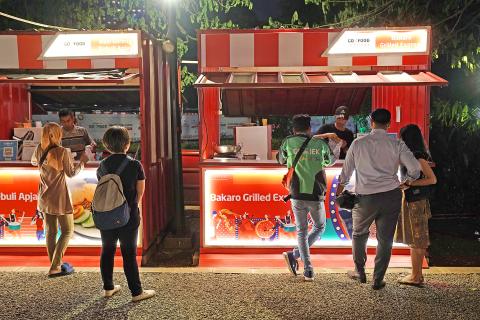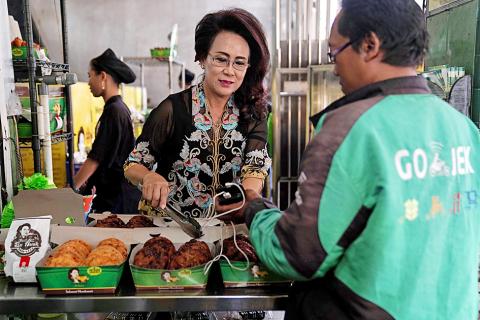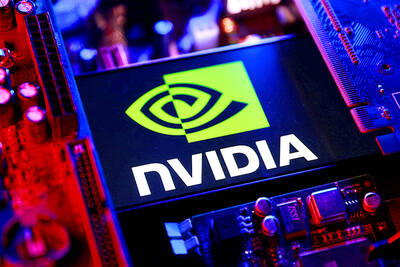Nanik Soelistiowati, the owner of a banana fritter stall in West Jakarta, is the unlikely prize in a battle between two of the most valuable technology start-ups in Asia.
The 64-year-old woman signed up for Gojek’s nascent food delivery service in 2015 after hearing about it from her children. Delivery motorbikes slalomed through traffic jams to deliver her delicious snack, which uses honey for a caramelized flavor, to all parts of congestion-choked Jakarta. Sales took off.
Then in 2017, rival Grab Holdings Inc approached her with an offer to undercut Gojek’s take of 15 percent. It was too good to refuse, and when Grab pushed aggressive discounts to consumers, demand spiked so much that Soelistiowati ran out of bananas to fry.

Photo: Bloomberg
SOUTHEAST ASIA’S HOTTEST
Grab and Gojek became Southeast Asia’s two hottest start-ups largely on the strength of their ride-hailing businesses, but now they are in the midst of an international food fight.
In the space of just four years, Jakarta-based Gojek has grown to have 400,000 food merchants such as Soelistiowati cooking up 50 million orders a month, or about 1.7 million orders per day, across locations in Indonesia, Vietnam and Thailand.

Photo: Bloomberg
Singapore’s Grab came in later, but it is catching up fast with the help of massive funding from SoftBank Group Corp and the acquisition of Uber Technologies Inc’s local ride-hailing and food delivery business last year.
This year, Grab says it has tripled sales and doubled its roster of merchants.
COMMON GROUND
The two companies are led by a pair who met while studying at Harvard Business School, with Gojek cofounder and chief executive officer Nadiem Makarim and Grab cofounder and chief executive officer Anthony Tan finding common ground in their shared background.
They also concur in seeing a bright spot in the food delivery market because it offers much more attractive margins than the more established ride-hailing business, said Florian Hoppe, a Singapore-based partner at Bain & Co.
“Today, the food delivery market is significantly smaller than transport in Southeast Asia, but it’s expected to be on par or bigger than on-demand transport by revenue over the next five years,” Hoppe said.
Globally, the online food order industry has grown into a hyper-competitive field, which has led to consolidation as companies claw for a bigger slice of more than US$300 billion in restaurant deliveries.
However, in Indonesia online food deliveries account for just 1.3 percent of the total food market, compared with 8 percent in the US and about 12 percent in China, according to data from Euromonitor.
“We are only scratching the surface in terms of penetration in this part of the world,” Gojek chief food officer Catherine Sutjahyo said. “We truly believe that this is a big opportunity.”
Elsewhere in the world, companies such as Uber are also aggressively moving into the food delivery business in search for higher profit margins, having identified the same opening as Grab and Gojek.
The Southeast Asian duo offer digital payments and sundry other services on top of their ride and food delivery staples, aiming to be the WeChat-like super app in the region.
Gojek, which processed US$2 billion of food delivery transactions last year, is not content just riding a rising tide. The company employs data and machine learning to study patterns of consumption, driver behavior and traffic.
So, when a user opens its app, the company takes into account their location, the time of day and their past behavior to predict their most likely desire. The GoFood app offers personalized recommendations based on what the user typically orders and food they have already rated.
Since Gojek embarked on international expansion late last year, GoFood has become available in Hanoi, Ho Chi Minh City and Bangkok, intensifying competition with Grab.
FOOD STALL FESTIVALS
Another successful Gojek strategy has been to organize food stall feasts at the Gelora Bung Karno Stadium in central Jakarta — where Guns N’ Roses and Linkin Park have staged performances.
One Friday evening in July, about 50 stalls outside the sprawling stadium offer crispy chicken topped with crushed chili paste, spice-filled beef soup and shaved ice in sweet coconut milk. People can eat in beanbag chairs or at tables nearby.
This carnival-like open-air space is called the GoFood Festival, and it has been so popular that Gojek has set up 30 such venues across the Indonesian archipelago.
People visit the places to dine in, but they can also use the Gojek app to order meals for delivery.
The company said it plans to open 10 more festival locations this year.
For participating restaurateurs and food stall owners, the GoFood Festival is attractive because of its low cost of entry. All they have to do is bring a cook, with no upfront cash required to rent a space, and Gojek takes a slice of the revenue.
Anggit Budi Setiawan and Felix Suryadi, two 38-year-old friends in the food business, said their monthly revenue has almost quadrupled to 300 million rupiah (US$21,326).
“People know our brand now,” Setiawan said. “That’s very exciting.”
Grab is racing to catch up.
GrabFood was still in beta when Soelistiowati brought her banana fritters to the service two years ago, but it has since expanded from one city in January last year to almost 200 Indonesian cities today.
It has also opened eight delivery-only kitchens, said Demi Yu, head of GrabFood Indonesia.
The scale of the service now “allows us to use data to provide insights on cuisine gaps, so we can bring in specialty foods not found in a particular area,” Yu said.
ALMOST ACCIDENTAL
The savvy use of technology and data is a hallmark of the two start-ups’ prodigious growth, but both stumbled upon food delivery almost by accident.
In its early days, Gojek did not have the resources to integrate restaurant orders into its app, so anytime a Gojek driver received a delivery order, they would have to drive to a restaurant, place an order, pay out of their own pocket and then get paid in cash upon delivery.
The sea of Gojek drivers in green jackets queuing up at popular stalls to pick up orders was a hint that the food delivery business might be something to take seriously.
Jeff Perlman, Singapore-based managing director at Warburg Pincus, said that the demand for food delivery was what stood out when his firm decided to invest three years ago.
“We felt that this would eventually be a multibillion-dollar business,” Perlman said.

POWERING UP: PSUs for AI servers made up about 50% of Delta’s total server PSU revenue during the first three quarters of last year, the company said Power supply and electronic components maker Delta Electronics Inc (台達電) reported record-high revenue of NT$161.61 billion (US$5.11 billion) for last quarter and said it remains positive about this quarter. Last quarter’s figure was up 7.6 percent from the previous quarter and 41.51 percent higher than a year earlier, and largely in line with Yuanta Securities Investment Consulting Co’s (元大投顧) forecast of NT$160 billion. Delta’s annual revenue last year rose 31.76 percent year-on-year to NT$554.89 billion, also a record high for the company. Its strong performance reflected continued demand for high-performance power solutions and advanced liquid-cooling products used in artificial intelligence (AI) data centers,

SIZE MATTERS: TSMC started phasing out 8-inch wafer production last year, while Samsung is more aggressively retiring 8-inch capacity, TrendForce said Chipmakers are expected to raise prices of 8-inch wafers by up to 20 percent this year on concern over supply constraints as major contract chipmakers Taiwan Semiconductor Manufacturing Co (TSMC, 台積電) and Samsung Electronics Co gradually retire less advanced wafer capacity, TrendForce Corp (集邦科技) said yesterday. It is the first significant across-the-board price hike since a global semiconductor correction in 2023, the Taipei-based market researcher said in a report. Global 8-inch wafer capacity slid 0.3 percent year-on-year last year, although 8-inch wafer prices still hovered at relatively stable levels throughout the year, TrendForce said. The downward trend is expected to continue this year,

A proposed billionaires’ tax in California has ignited a political uproar in Silicon Valley, with tech titans threatening to leave the state while California Governor Gavin Newsom of the Democratic Party maneuvers to defeat a levy that he fears would lead to an exodus of wealth. A technology mecca, California has more billionaires than any other US state — a few hundred, by some estimates. About half its personal income tax revenue, a financial backbone in the nearly US$350 billion budget, comes from the top 1 percent of earners. A large healthcare union is attempting to place a proposal before

‘BASICALLY A BAN’: Sources said the wording governing H200 imports from officials was severe, but added that the regulations might change if the situation evolves Chinese customs authorities told customs agents this week that Nvidia Corp’s H200 artificial intelligence (AI) chips are not permitted to enter China, three people briefed on the matter said. Chinese government officials also summoned domestic technology companies to meetings on Tuesday, at which they were explicitly instructed not to purchase the chips unless necessary, two of the people and a third source said. “The wording from the officials is so severe that it is basically a ban for now, though this might change in the future should things evolve,” one of the people said. The H200, Nvidia’s second-most powerful AI chip, is one